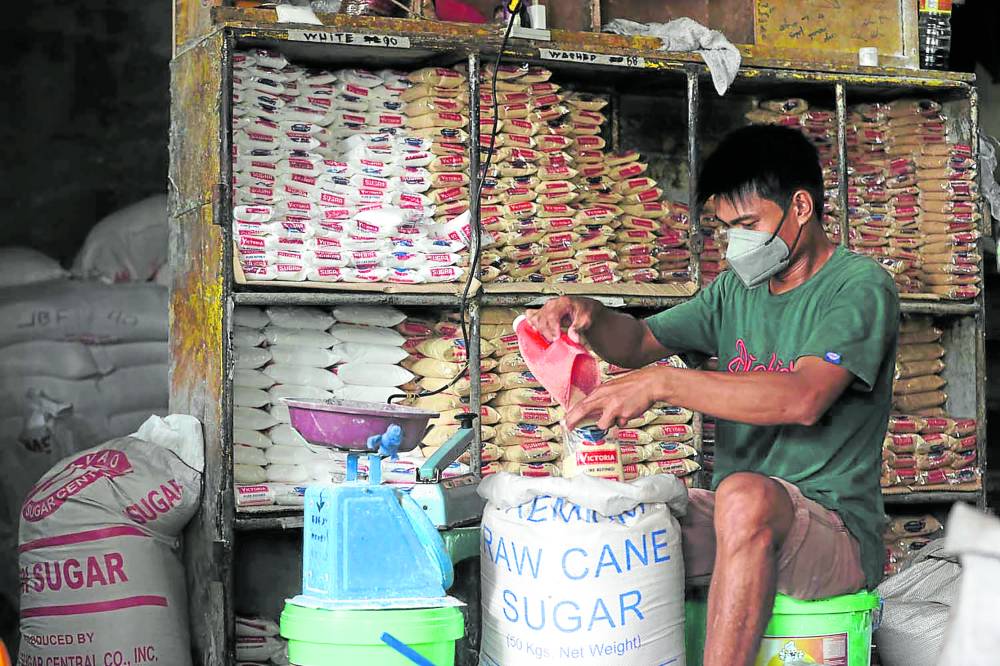Sugar imports to hurt small farmers, 2 agri groups warn

A store helper repacks washed sugar at Tandang Sora Public Market in Quezon City. —NIÑO JESUS ORBETA
BACOLOD CITY—Leaders of two sugar groups have expressed dismay over an order authorizing the importation of 440,000 metric tons (MT) of refined sugar to temper domestic prices.
Enrique Rojas, president of the National Federation of Sugarcane Planters (NFSP), and Aurelio Valderrama Jr., president of the Confederation of Sugar Producers Association (Confed), said this volume to be imported was more than what was needed and could drive down domestic mill gate prices to the detriment of small farmers.
Rojas said the impending importation would trigger an oversupply and cause more financial suffering to sugarcane planters, particularly the marginal farmers.
“The 440,000 MT importation is more than enough for our projected production shortfall,” he pointed out.
The NFSP, Confed and the Panay Federation of Sugarcane Farmers earlier recommended an import volume of only 350,000 MT.
Article continues after this advertisementThe Sugar Regulatory Administration (SRA) on Wednesday released Sugar Order No. 6, authorizing the importation of 440,000 MT of refined sugar.
Article continues after this advertisementThe order was signed by Agriculture Senior Undersecretary Domingo Panganiban, acting SRA Administrator David Alba, and other SRA board members and was transmitted to the Office of the President on Feb. 9.
The latest import order says the first tranche of 100,000 MT must enter the country “as soon as possible,” and the second tranche of another 100,000 MT before April 1. Meanwhile, the sugar stockpile of 240,000 MT must be delivered not earlier than April 1.
A copy of the order that was released to the media did not have the signature of President Marcos, who concurrently sits as agriculture secretary.
“With this oversupply of sugar, there is only one direction for mill gate sugar prices to go, which is down,” Rojas said.
He noted that the arrival of the first 200,000 MT before the end of March would most likely further depress mill gate sugar prices, which already declined by P200 to P300 per bag last week compared to prices in the previous weeks.
“Most sugarcane planters are still harvesting and milling their canes. The ill-advised schedule of arrival of the first 200,000 MT of imported sugar before the end of March will surely be detrimental to us,” Rojas said.
“We are still suffering from the high cost of fertilizer, fuel and other farm inputs,” he added.
Valderrama said the importation would have “a negative effect on current millgate prices since milling is still ongoing.”
No transparency
Valderrama also stressed that under section 5 of the import order, the Department of Agriculture (DA) has final discretionary authority to approve import applications.
“This is the first time such a condition is provided. This could constitute excessive discretionary power granted to the DA and is a possible circumvention of the Sugar Industry Development Act (Sida),” he said.
In the previous importations, the SRA approved import applications and allotted the volume to participating importers.
Valderrama said there was no provision that ensures transparency in the granting of import permits with too much discretionary power in the hands of the DA, relegating the SRA to a mere recommendatory authority.
Confed also questioned the definition of “consumers” in the SRA import order to pertain only to manufacturers, industrials, retailers, repackers, wholesalers and traders.
The definition, according to Confed, did not include “actual final consumers” and requires participants to be engaged in the business of selling physical sugar to the consumers as defined in the order.
“If a producers’ cooperative, which is an SRA-accredited trader, only sells physical sugar to final consumers, and not to the other ‘consumers’ (as listed by the order), it may not qualify for import allocation. This limits the number of producers’ cooperatives that may qualify,” it said.
“Confed reiterates its earlier recommendation for a transparent, fair and equitable importation program, open to all SRA-accredited international sugar traders and with the participation of sugar producers on a pro-rata basis, for a total volume of 350,000 MT to come in two tranches (175,000 MT in July 2023 and another 175,000 MT in August), subject to evaluation of actual market conditions,” Valderrama said.
“We ask SRA to consider this as our desire to provide members equal opportunity to participate in programs that will affect them directly,” he added.
Mill takeover
Meanwhile, House Deputy Minority Leader France Castro on Thursday urged the government to take over the operations of a recently shut sugar processing facility, the second biggest in Luzon, instead of importing more sugar.
The closure in December last year of the Central Azucarera Don Pedro Inc. (Cadpi) affected some 12,000 sugar farm workers in Batangas province, prompting the Makabayan bloc to file on Thursday House Resolution (HR) No. 785 calling for a congressional inquiry on its shutdown.
Castro said that apart from leaving 12,000 workers jobless, Cadpi’s closure could also result in huge losses for 4,584 sugarcane farmers as the remaining sugar mill in Batangas can process only 4,500 MT of sugarcane daily compared to Cadpi’s 12,000 MT.
“So instead of again importing sugar, the Marcos administration should take over Cadpi to save the sugar industry and prevent thousands of sugar farm workers from losing their jobs,” Castro said.
Gabriela women’s party list Rep. Arlene Brosas, in filing HR 785, said Cadpi’s shutdown caused more than 300,000 metric tons of sugarcane to remain unprocessed and could bankrupt 4,854 sugarcane planters.
Workers affected by the Cadpi closure met on Wednesday with Speaker Martin Romualdez to air their concerns.
During the meeting, Romualdez conferred with Batangas Gov. Hermilando Mandanas and Batangas Rep. Eric Buhain to discuss possible solutions as he acknowledged the important role of farmers in ensuring the country’s food security.